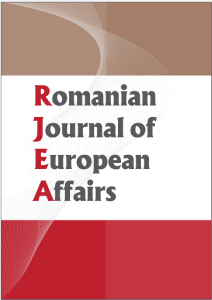În ediţia de primăvară a Romanian Journal of European Affairs, autorii ne propun teme legate de criza Uniunii Europene şi modul de a se reflecta în sfera publică din România, cel de-al treilea mandat al preşedintelui Putin în Federaţia Rusă, cetăţenia politică în contextul Tratatului de la Lisabona, aspecte privind oferta partidelor politice pentru alegerile pentru Parlamentul European în cazul Republicii Cehe şi o recenzie de carte privind lobby-ul în Uniunea Europeană.
The Crisis of the European Union and its Reflection in the Romanian Public Sphere. Recent Findings
Alina Bârgăoanu, Flavia Durach
Abstract:
This paper addresses the implications of the euro crisis, which turned from „a Greek mess” to a political, institutional, economic and confidence crisis of the European Union. In our view, the EU public sphere is relevant for the current debate surrounding the crisis because it represents the setting where solidarity among EU citizens and EU states is created. Given our interest in the concept of the EU public sphere and the way the crisis of the European Union influences the debates in the public sphere, the way in which solidarity among EU citizens and EU states is imagined and enacted, we carried out a research project focused on the Romanian public sphere in the context of the crisis. The research project was carried out around a crucial event in the process of crisis resolution: the signing of the Treaty on Stability, Coordination and Governance in the Economic and Monetary Union by 25 EU member states at the beginning of March 2012. The results show that in Romania, for the moment at least, the “EU” has not fallen victim to the crisis. There is a considerable drop in public trust in the EU, but it is our assessment that the descending trend could be reversed, provided a clear vision, accompanied by strong leadership, emerges.
Keywords: Coordination and Governance, euro crisis, Euro scepticism, European public sphere, Treaty of Stability
Putin’s Third Term: The Triumph of Eurasianism?
Paul Pryce
Abstract:
In the midst of the Russian Federation’s 2012 presidential election, Vladimir Putin expressed his support for the establishment of a functioning Eurasian Union by 2015. This article attempts to demonstrate that this Eurasian push, taken in context together with a number of other policies and programs pursued by Putin and Dmitri Medvedev, reflects a shift in Russian identity politics towards neo-Eurasianism. In doing so, the potential weaknesses of neo-Eurasianism as an identity framework for the whole of Russian society will be highlighted, indicating that the further centralization of political authority with the core (Moscow) will only exacerbate grievances in the regions of the periphery.
Keywords: Eurasian Union, Eurasianism, nationalism, Russian Federation, Vladimir Putin
The Political Citizenship in the Context of the Lisbon Treaty
Oana – Măriuca Petrescu
Abstract:
The notion of citizenship introduced by the Maastricht Treaty and modified by the Amsterdam Treaty, can be associated, among other things, with the political or democratic citizenship, based on a set of common political rights, with the main purpose of empowering the citizens to be “co-authors” of the law within the European decision-making process. In this context, an important step has been made by the adoption and entering into force of the Treaty of Lisbon, as the general framework containing the legislative power, and by the Regulation (EU) No. 211/2011 on the citizens’ initiative adopted by the European Parliament and the Council, which defines the rules and procedure governing this new instrument, that was officially launched on 1 April 2012. This new legal instrument, as one of the major innovations of the Lisbon Treaty will strengthen the democratic foundations of the European Union by regulating the possibility for the citizens to invite the European Commission, within the framework of its powers and in certain circumstances, to submit any appropriate proposal on matters where they consider that a legal act of the European Union is required for the purpose of implementing the Treaty – art. 11 (4) of TFEU – or to be more actively involved in the political life of EU and therefore, to take part in the decision-making process at European level.
Keywords: citizenship, political rights, Regulation, right to initiative, Treaty of Lisbon
The Supply Side of Second-Order Elections in the Czech Republic: A Light at the End of the Tunnel?
Jan Kovar
Abstract:
This paper attempts to contribute to the debate on the Europeanization of European Parliament elections. Because these elections are supposedly fought over national political issues, the analysis focuses on one aspect of political parties’ supply for these elections, namely their election programmes. To this aim, a content analysis is conducted, within a comparative framework, of selected Czech political parties’ programmatic documents. At the same time, the question is asked: to what extent do these programmes offer EU-level solutions-in other words, in terms of issues, does Europeanization or domestication prevail in the manifestos? The results show that parties focus on EU issues in their Euro manifestos and feature an apparent degree of Europeanization of this part of their supply for EP elections. From this perspective, these results can be considered a light at the end of the (second-order) tunnel, given that at least the programmatic part of parties’ supply is about European integration after all.
Keywords: election manifestos., European Parliament elections; second-order elections; political parties, Europeanization
Book Review: Lobbying the European Union: Institutions, Actors and Issues, David Coen and Jeremy Richardson (eds.)
Alexandra Pop
Abstract:
The volume “Lobbying the European Union: Institutions, Actors and Issues”, collects 16 articles on interest group politics at EU level, focusing on the main elements of European lobbying – the existing relations between the EU institutions and the special interests, the main differences between NGO and business lobbying, the specific lobbying strategies adopted in EU’s main policy sectors or lobbying regulations. The volume captures the main changes that took place on the European lobbying scene in the last two decades, period in which most EU institutions developed new points of access for lobbyists, while the interest groups became more specialized. The success of an EU lobbying campaign seems to be determined by a combination of various factors such as: a good knowledge of the EU environment, a wise usage of both financial resources and expertise, direct lobbying complemented by an efficient usage of domestic routes and the capability of creating smart alliances.
Keywords: EU lobbying, interest groups politics, lobbying regulation, lobbying resources, lobbying strategies






